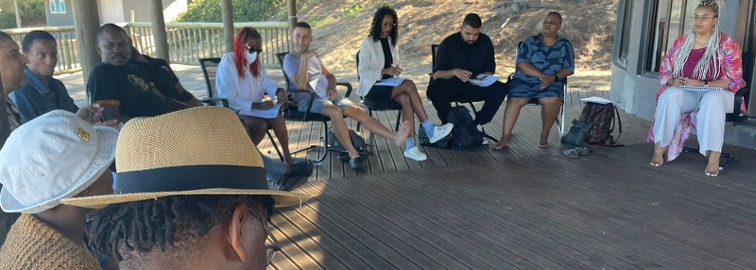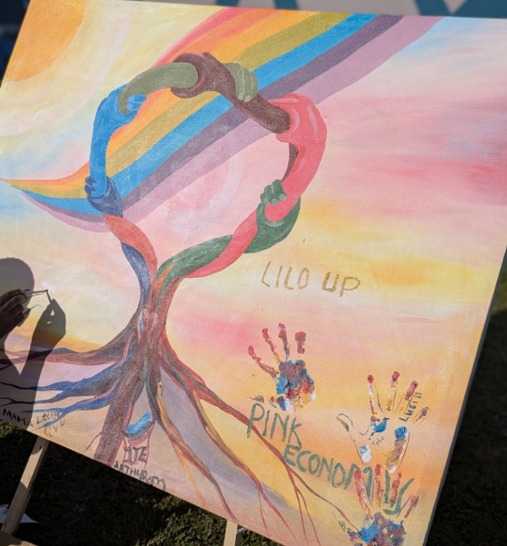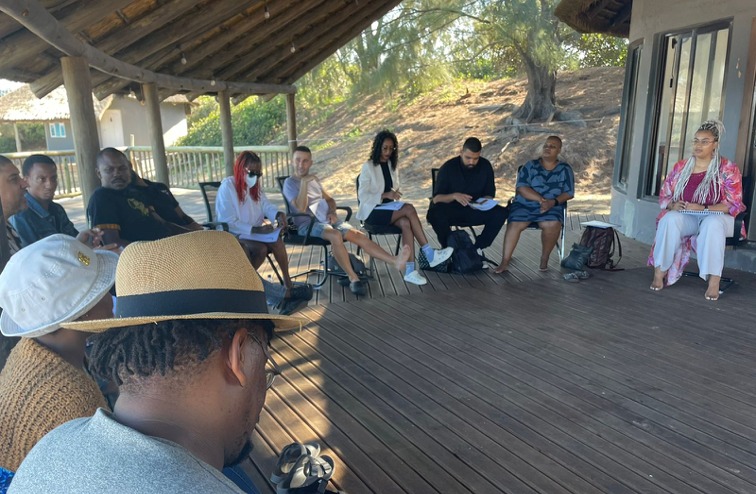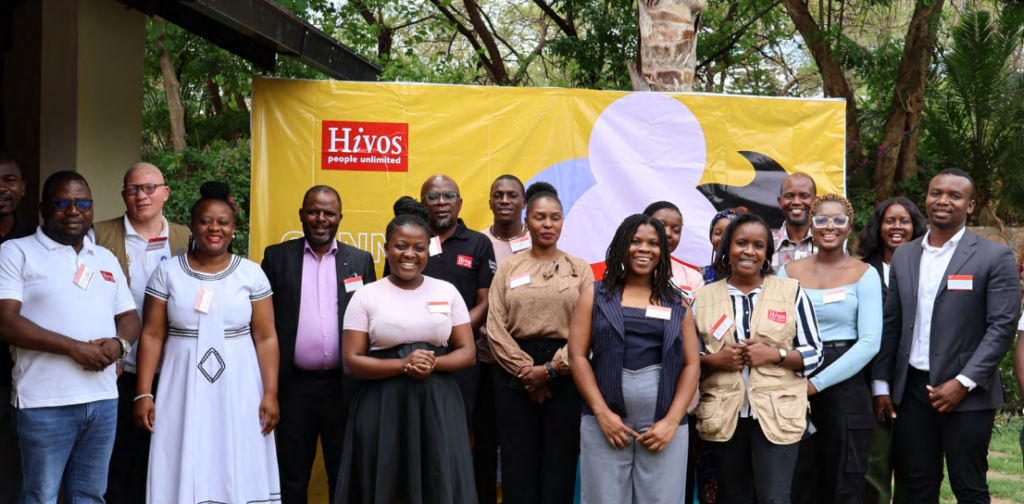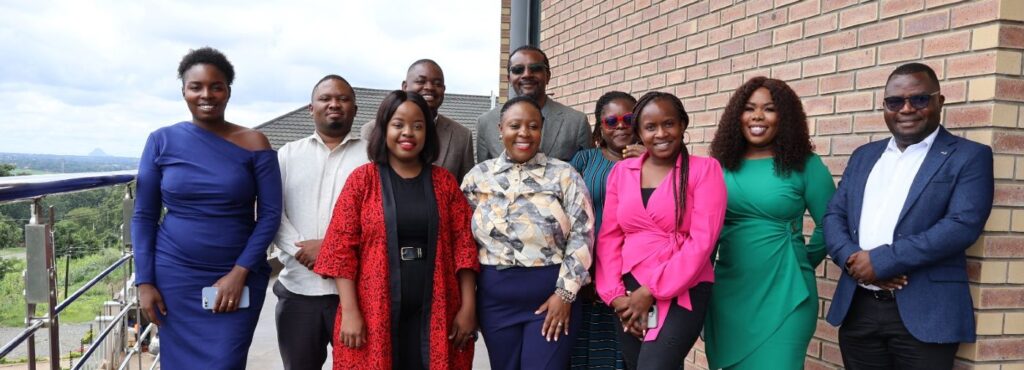LILO Up! was born from a simple but profound question: what happens when we bring the heart of LILO (looking In, Looking Out) — deep reflection, authenticity, and agency — into the realm of money, the economy, and futures?
For years, Positive Vibes had worked with rightsholders through LILO methodologies to explore identity, relationships, and rights. Time and again, however, one truth became unavoidable: dignity, inclusion, and self-determination could not be separated from the economic realities in which people lived. The conversation on rights often ran into the hard wall of survival. How could people claim equality in societies that still excluded them from jobs, livelihoods, and opportunities?
As one LILO Up! participant later reflected:
“I always believed my story ended with survival. For the first time, I started to imagine a future that was more than just making it to the next day.”
LILO Up! is one possible answer to this question.
Why LILO Up?
The seeds of LILO Up were planted in April 2023 when Positive Vibes and partners conducted a global survey on the economic status of LGBTIQ+ individuals across the Free to Be Me and We Lead communities of action. Nearly 400 people responded. The results were sobering:
- Over a third of respondents reported skipping meals because they could not afford food.
- 18% had no housing at the time of the survey.
- 43% had experienced homelessness in the last five years.
These results were from individuals already connected to civil society networks — people with higher education and greater access to opportunities than many others. The true scale of economic exclusion in their wider communities was likely much worse. And when providing feedback to individuals and organizations on the survey, people repeatedly emphasized that the vulnerability we were seeing was higher in the communities where they worked.
Yet, amidst these hardships, the survey also revealed something powerful: a deep hunger for change. Respondents expressed a strong desire to participate in an economic empowerment program, to set career goals, build livelihoods, and imagine futures that had been out of reach.
One participant put it simply:
“I don’t just want to survive as a queer person. I want to build, to learn, to succeed.”
This call to action shaped the birth of LILO Up! with Positive Vibes’ developing and piloting a new methodology under F2BM’s Economic Development pathway.
LILO Up! was not designed as a typical economic empowerment process. It wasn’t about quick fixes, small grants, or entrepreneurship checklists. Instead, it carried the DNA of LILO: beginning with the self, surfacing authentic experiences, and then moving outward to connect with larger realities.
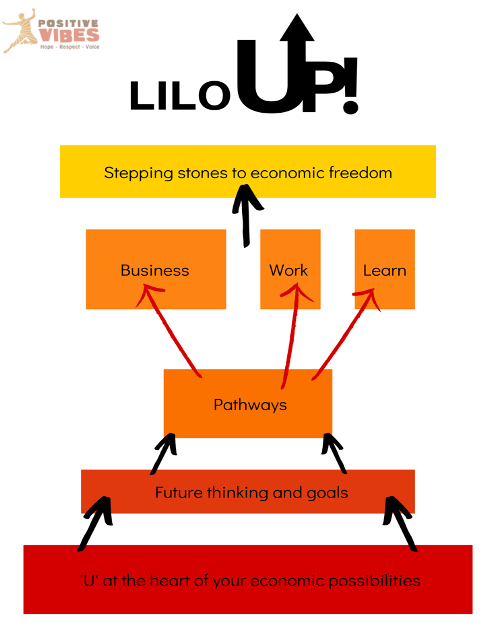
The flow of LILO Up! is both simple and transformative:
- Inside → Participants began with personalization, exploring their own intellectual and emotional relationship with money. For many, this was the first time they named the fears, anxieties, and hidden beliefs that shaped their financial decisions.
“I never realized how much fear guided my choices about money. In the workshop, I could finally name it — and that gave me strength to change it.”
- Out → The process widened to the local and global economic context. Participants examined structural barriers, market realities, and systemic inequalities. This helped them see that while challenges were personal, they were also political and collective.
“For the first time, I saw that it wasn’t only me who was failing. The system is hard, but I can still find openings if I know where to look.”
- Up → Participants envisioned a Golden Goal — a clear, motivating aspiration for the future. From there, they mapped realistic pathways to get there, through employment, entrepreneurship, or education.
“My Golden Goal is to go back to school. Saying it out loud made it feel real. Now I have steps to get there.”
This process was not only practical but also deeply conscientizing. It shifted perceptions of money from something shameful or unattainable to something participants could engage with strategically and confidently.
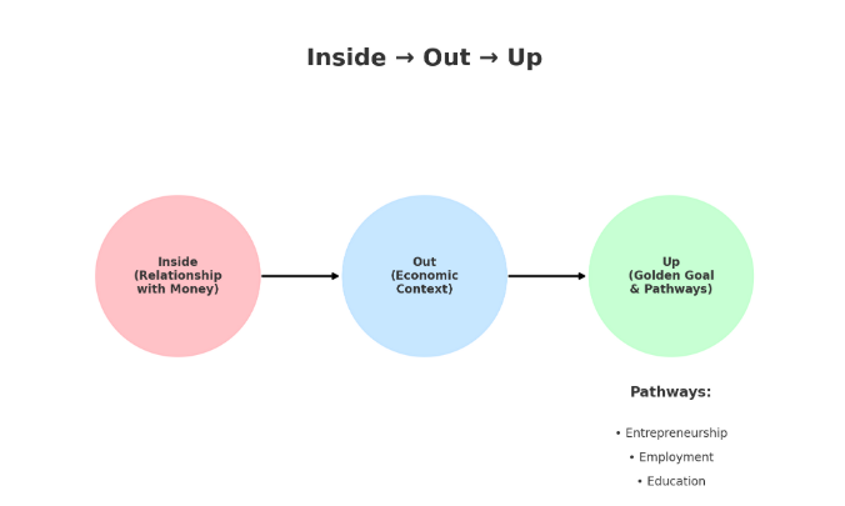
Pilots and rollout
The first pilot was held in Mozambique in February 2024, bringing together Free2Thrive fellows from 12 countries alongside PV and Hivos representatives. Though not the ultimate target group, the pilot participants offered invaluable feedback. They highlighted the strength of the personalization approach, regardless of career stage, and made practical suggestions for improving examples and case studies.
Later that year, in November 2024, the first global facilitator training was held in Kenya. Thirteen countries participated, many represented by people who had attended the Mozambique pilot. This allowed PV to experiment with a hybrid training model — part content, part facilitation practice. The process also reinforced an important design principle: the workshop should be flexible enough to adapt to both “economically savvy” participants and grassroots communities.
By the end of 2024, the first in-country workshops were held in Kenya, Nigeria, and Zimbabwe. With refinements made, the rollout expanded in 2025 to Ghana, Mozambique, Uganda and Indonesia.
Yet, not every context was smooth sailing. In Zimbabwe, rollout was halted midway. In Namibia and Rwanda, workshops were cancelled. These interruptions underscored the reality that a methodology always lands in shifting programmatic and local contexts.
As one Zimbabwean participant said:
“We didn’t finish the program, but even from the first days, something shifted in me. I began to see myself as someone with choices.”
Shifts big and small
It is still early to measure longer term impact. But already, shifts in mindset, confidence, and action are visible.
Participants describe feeling more purposeful, confident, and supported:
- “LILO Up is the best thing that happened to me this year.”
- “The vision board I created is still on my wall. Every time I look at it, I remember I can do this.”
- “I discovered skills in myself I never valued before — now they are helping me live independently.”
Concrete economic changes are also emerging:
- One participant diversified their small business by learning massage therapy, expanded their poultry venture, and now mentors young queer people in agri-business.
- Several participants mentioned intentionally budgeting and getting themselves out of debt following LILO Up!.
- Another, whose Golden Goal was to launch an M&E consultancy, pivoted after facing funding challenges and is now pursuing studies abroad in digital technology for social impact.
- A participant who once longed to leave their family home instead led a renovation project that brought their family closer together. They’ve since saved nearly $1,000, enrolled in school, and supported a woman in her community to start raising chickens
- Others have opened shops, started import businesses, or built multiple income streams.
As one participant said:
“If you have a plan, it attracts other plans. I didn’t just change my life; my family came along with me.”
Follow-up sessions called Stepping Stones (ideally held 2, 4, and 6 months after workshops) have been critical for accountability and solidarity. Participants share progress, challenges, and inspiration. One noted:
“The check-ins challenged me in a good way. They remind me I’m not alone, and if others are doing great things, so can I.”
Lessons and future possibilities
For Positive Vibes, LILO Up! has been both a bold experiment and a deep learning process.
- It confirmed that economic empowerment can be approached through reflection and agency, not only material support.
- It reinforced that methodologies must be adaptable: what works in urban Kenya may need adjustment in rural Mozambique.
- It reminded us that hope is as important as strategy: when people begin to see themselves as capable of change, pathways open.
The methodology’s potential extends beyond LGBTIQ+ communities. With adaptation, it could serve other marginalised groups facing systemic economic exclusion.
As one facilitator put it:
“The most powerful thing wasn’t the goals participants chose — it was watching them believe, maybe for the first time, that those goals were possible.”
The Legacy of LILO Up!
LILO Up! is more than a personal development process. It is also an advocacy tool. By equipping rightsholders to define and pursue economic goals, it strengthens collective voice and contributes to the wider push for LGBTIQ+ inclusion in socioeconomic development.
This links directly to Intermediate Outcome 4 of the Free to Be Me program: ensuring that national and international development initiatives and companies act to make economic development programs more accessible to LGBTIQ+ people.
Looking around at the global economic and political context, as well as at national shifts in the countries where we work, interventions that address economic realities while being grounded in human rights are increasingly relevant. Intentionally and directly centering LGBTIQ+ people, and other marginalized groups, within Sustainable Development Goal (SDG) 8 on Decent Work and Economic Growth is vital to enabling more choice, protection and possibility in increasingly hostile environments. LILO Up! also connects to the growing recognition of a Pink Economy that does not just mean large companies attempting to draw in wealthy queer consumers, but as something that could be a space of innovation and resilience within communities.
This journey so far has shown that even in contexts of scarcity and exclusion, when people are invited to start with themselves, recognise their context, and envision futures, possibility begins to move.
Or, in the words of one participant:
“LILO Up gave me back the power to dream. And once you dream, you cannot go back to not dreaming”

